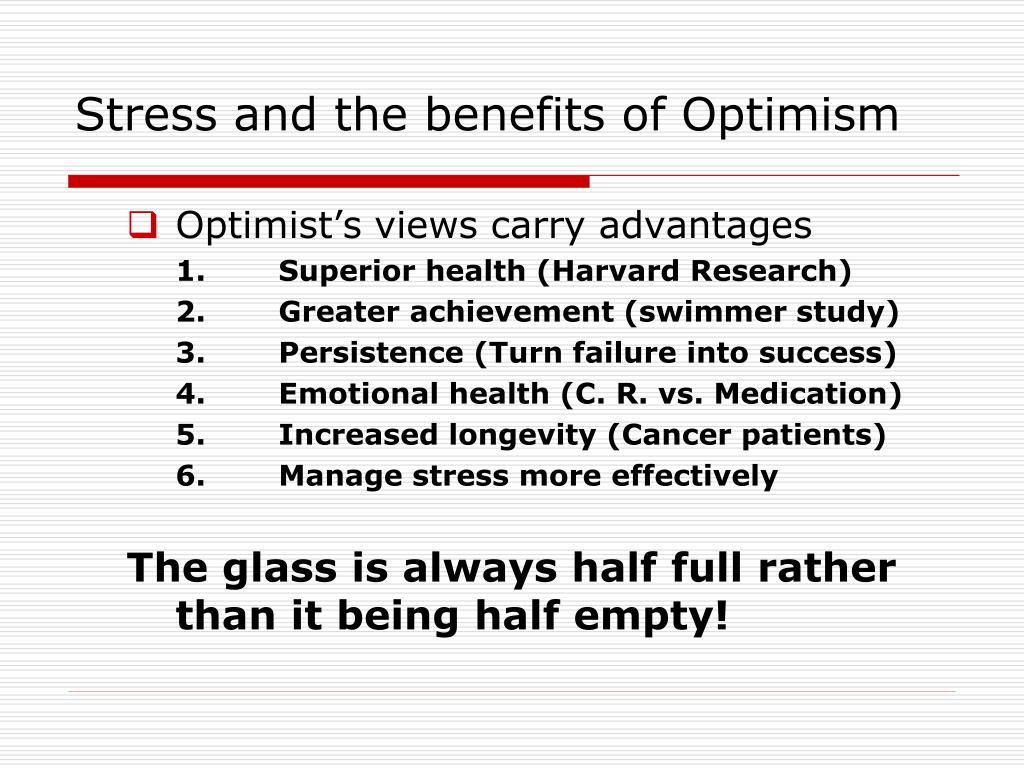


Scheier and Carver theorized the “disposition” towards optimism in their studies, called “dispositional optimism”, considering it a trait of an equilibrated personality, in time and in various situations, that influences the way in which individuals come to terms with present, past and future events in life. Over the last few years, a significant body of research has been carried out about the effectiveness of optimism as a psychological phenomenon, leading to various theoretical formulations of the same concept, understood as “disposition”, “attributional style”, “cognitive bias”, or “shared illusion”. Optimism may significantly influence mental and physical well-being by the promotion of a healthy lifestyle as well as by adaptive behaviours and cognitive responses, associated with greater flexibility, problem-solving capacity and a more efficient elaboration of negative information.Īs it is commonly understood, the term ‘optimism’ embraces two closely correlated concepts: the first is the inclination to hope, while the second more generally refers to the tendency to believe that we live in “the best of all possible worlds”, as coined by the German philosopher Gottfried Wilhelm Leibniz in his famous theodicy, ridiculed in Voltaire’s Candide. There is evidence that optimistic people present a higher quality of life compared to those with low levels of optimism or even pessimists. Through employment of specific coping strategies, optimism exerts an indirect influence also on the quality of life. A significant positive relation emerges between optimism and coping strategies focused on social support and emphasis on positive aspects of stressful situations. Positive and negative expectations regarding the future are important for understanding the vulnerability to mental disorders, in particular mood and anxiety disorders, as well as to physical illness. This overview is an attempt to explore the “optimism” concept and its relations with mental health, physical health, coping, quality of life and adaptation of purpose, health lifestyle and risk perception. Koga, PHS-PhD ’22.Many studies have been carried out about the effectiveness of optimism as a psychological phenomenon, leading to various theoretical formulations of the same concept, conceptualized as “disposition”, “attributional style”, “cognitive bias”, or “shared illusion”. Other SBS-affiliated coauthors in the study include Claudia Trudel-Fitzgerald, Research Scientist, and Hayami K. “It was striking to see that much of a protective effect-and also that the finding held for both women and men, and across racial and ethnic groups.” “We found that those who tested highest for optimism at the start of the study had a 22% lower risk of developing hypertension during three-and-a-half years of follow-up than those who scored the lowest,” says Dr.

People in the military tend to be more susceptible to early-onset hypertension due to combat exposure and other stressors. Kubzansky and others analyzed 103,486 global assessment tool (GAT) responses, a self-report questionnaire assessing psychosocial functioning, from relatively young and healthy U.S. In the interview, she speaks about her recent study where she and her co-authors have associated optimism with lowered hypertension.ĭr. Laura Kubzansky, Lee Kum Kee Professor of Social and Behavioral Sciences, recently spoke with Communications’ Amy Roeder in the latest edition of The Big 3.


 0 kommentar(er)
0 kommentar(er)
